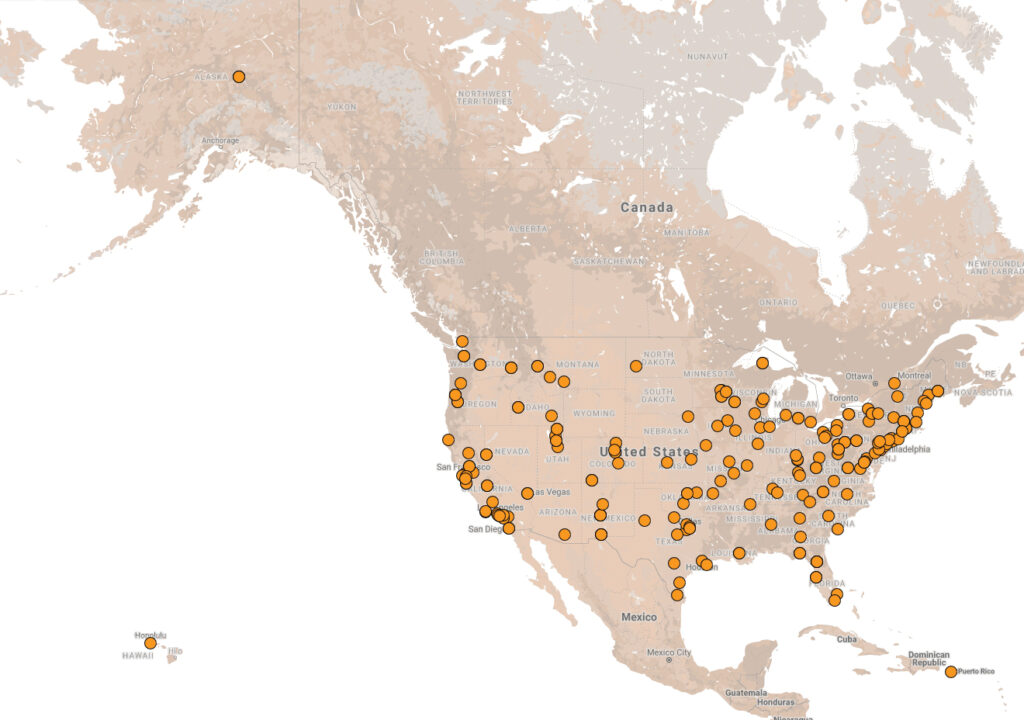GeoPRISMS has actively engaged in developing and maintaining an Education & Outreach program geared towards the broader science community and the general public. The well-established GeoPRISMS Distinguished Lectureship Program (DLP) has played an instrumental role illustrating the depth and breadth of the GeoPRISMS program, disseminating new findings, and increasing global learning. Starting in 2010, the DLP sponsored 10 lecture series centered around GeoPRISMS research topics. 36 scientists – half of them women – selected from a wide range of disciplines and career levels traveled across the United States and beyond to share the cutting edge science they conducted through GeoPRISMS. The presentations offered by the speakers included standard academic seminars, guest lectures in Earth Sciences undergraduate and graduate level courses, and public talks. The DLP has been extremely popular and received strong interest, with applications from over 500 US institutions and abroad. From moderate-sized community and liberal arts colleges, to museums and public venues, 226 institutions hosted a DLP Speaker and more than 10,000 people have attended these lectures.
The lecture series was coordinated by the GeoPRISMS Office. Applications, usually announced in early summer, were opened to any US college or university. Institutions that were not currently involved with GeoPRISMS research were strongly encouraged to apply, including those granting undergraduate or masters degrees, as well as those with PhD programs. The office promoted the program and mailed the lecture brochure each year to over 600 Geoscience departments and science centers across the US. The information was also shared on social media and through the GeoPRISMS listserv and newsletter. The office provided logistical support and guidance to the hosts to ensure the program goals were achieved. Best practices were codified and shared with hosts to properly advertise the speaker’s visit, arrange local visits to public venues, provide enough flexibility to accommodate the speaker’s schedule, and record the lectures for archival and dissemination – available recordings are compiled on the GeoPRISMS Youtube channel. The GeoPRISMS Office carefully prepared the Speakers’ itineraries based on their availability. Requests from the hosts were also taken into consideration. Efforts were made to coordinate visits to neighboring institutions to make the most of the Speakers’ time and the budget allocated to the lecture series. By doing so, the office managed to keep the acceptance rate to about 40% despite budget limitations and subsequent reduction of the number of speakers (scaled down from 8 to 6 in 2015, then to 4 in 2016). Hosts were responsible for accommodation and local expenses, GeoPRISMS supported the speakers’ travel expenses.
As highlighted in feedback from the hosts and attendees, the benefits of the DLP went beyond programmatic updates. The lecture series offered outstanding opportunities for students to interact with experts and be exposed to new topical areas, steering them in new scientific directions. In conjunction with their lectures, the DLP Speakers alloted time to meet with the students to share their valuable experience and answer questions regarding career and research opportunities. The DLP lectureship has greatly stimulated students’ interest and infused a sense of possibilities in pursuing alternative paths in science.
The DLP also improved the representation of women in STEM – successful female scientists discussing their accomplishments undeniably inspired female students and Early Career Investigators to pursue education in geosciences. Additionally, the program extended the reach and inclusiveness of GeoPRISMS science by bringing high-caliber speakers to departments geographically isolated and/or with no or limited speaker series budget. DLP visits would often draw audiences from across campus and neighboring institutions – sometimes from over 50-miles away. The DLP initiated new collaborations, strengthened networks, drew new avenues of research and overall raised the level of academic discussion amongst students, postdoctocs, and more established researchers.
A well-coordinated lecture series such as the DLP has offered a diverse array of exciting and relevant geoscience topics. While the lecture series has successfully promoted the activities and products of the GeoPRISMS Program, the DLP also provided an excellent education opportunity for the public and college audience and raised the level of geoscience awareness. The GeoPRISMS Office thanks the institutions for hosting a Speaker and for making the Distinguished Lectureship Program such a success. The GeoPRISMS office is also grateful to the 36 researchers who have served as a GeoPRISMS Distinguished Speaker – for taking time out of their busy schedules to travel on behalf of GeoPRISMS, for sharing their work and their passion, and for inspiring a whole new generation of scientists.
– Anaïs Férot, March 2021
The Distinguished Lectureship Program (DLP) was intended to serve several purposes, key among them:
- To inform the interested public, research, and education communities about the GeoPRISMS Program and exciting research activities and opportunities.
- To bring GeoPRISMS research and the GeoPRISMS community to smaller institutions that may not have regular lecture programs.
- To allow researchers, students, and the public to meet and interact with GeoPRISMS researchers, both by attending their lectures, but also through informal discussions with the DLP speakers before and after their presentations.
- To enable the DLP speakers to meet a wide range of researchers, students, and others whom they might not otherwise have the chance to meet.
To best achieve these goals, the GeoPRISMS Office recommended best practices for institutions hosting a DLP lecture

